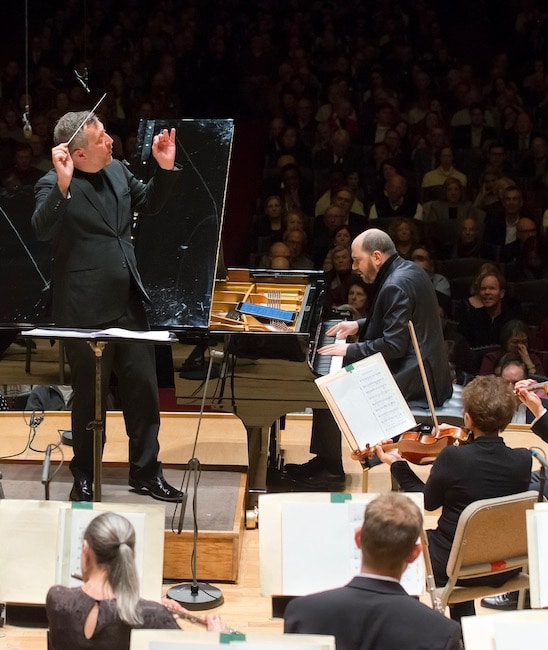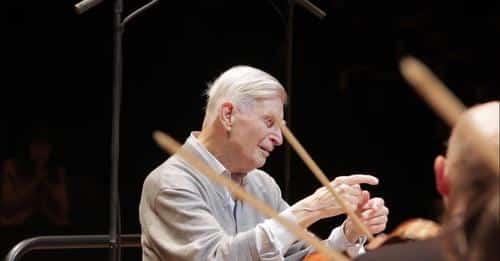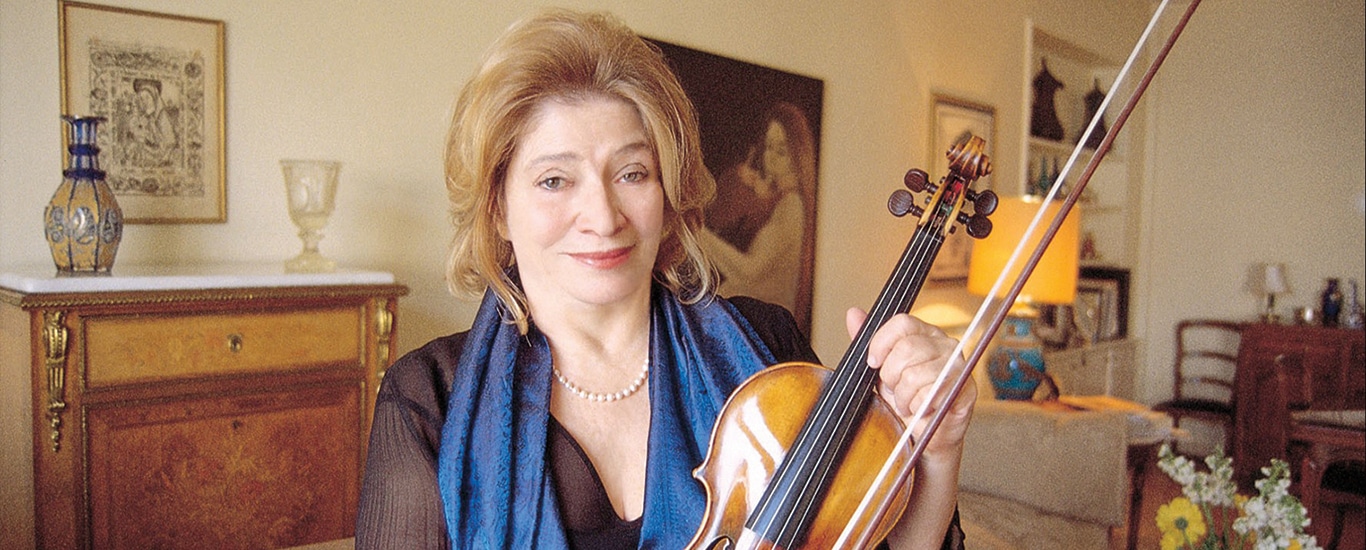So, the new Ades concerto: any good?
mainKirill Gerstein performed the world premiere of Thomas Adès’ piano concerto with the composer conducting the Boston Symphony Orchestra last night.
First review here.

Photo: Winslow Townson

Kirill Gerstein performed the world premiere of Thomas Adès’ piano concerto with the composer conducting the Boston Symphony Orchestra last night.
First review here.

Photo: Winslow Townson
The numbers are in at the Erl winter…

The conductor, 97, gives a reflective interview to…

The Czech National Theatre has started the year…

The death has been announced of the leading…

Session expired
Please log in again. The login page will open in a new tab. After logging in you can close it and return to this page.
Thrilling performance by both Gerstein and the BSO. The review is spot on. My only negative reaction is that thick orchestration overwhelmed the piano at times in the first movement. I particularly liked the slow middle movement, in which each new chord from the piano was unexpected. And the finale was riveting. The audience loved it.
Like any complex major contemporary piece, it should benefit from repeated listening.
Anybody with an internet connection can hear it Saturday at 8PM Eastern Standard Time (I believe GMT is five hours later) at https://www.classicalwcrb.org/
Ades must be a true genius, as there haven’t been since the Golden Days. Or else, it’s the critic’s fear to appears in the next edition of Slonimsky’s “Lexicon of Musical Invective”.
I read four reviews – all positive. After listening to the embedded snippet, I am looking forward to hearing the whole piece.
Michael Gielen! RIP
As told to me by someone there:
“Next question.”
I had the good fotune to hear the first performance of this astonishing piece last night. I am unable to recall a single new work in decades that has made such a powerful impression on me. To my ears, Adès’ Concerto for Piano and Orchestra is a masterpiece that deserves a place alongside the greatest concertos in the repertoire. Its technical demands are considerable, as are the challenges of its fresh and ever surprising musical language, but I imagine no more so than were the Brahms 1st, Bartók 2nd, or the Ligeti to the ears and fingers of their time. And, unlike so many composers, Adès is a marvelous advocate for his own music – his conducting not only of the concerto but also the Tchaikovsky 4th was incandescent. As for Kirill Gerstein, whose pianism was something of an inspiration for Adès, a longtime collaborator, it is hard to overpraise his deeply affecting – and at times jaw-dropping – performance. The special relationship that the Boston Symphony Orchesta made with Adès (and recently extended) has borne extraordinary fruit for both – the BSO is playing at the very highest level, as it must to fully realize this magnificent new work.
You don’t have to be in Boston to hear the concerto – a live radio broadcast will stream from the WCRB website on March 9th, at 8pm ET, and WCRB will re-air and stream it on Monday, March 18th, at 8pm ET. Don’t miss it!
In addition to the entire concert being broadcast on March 9 at 8PM Eastern time, it will be repeated on Monday March 18 at the same time at https://www.classicalwcrb.org/
Here are some other reviews from the Boston Globe (https://www.bostonglobe.com/arts/music/2019/03/08/ades-piano-concerto-receives-impressive-world-premiere-from-bso/weNvjoXQvtjKF99QwEJV4M/story.html), the New York Times (https://www.nytimes.com/2019/03/08/arts/music/piano-concertos-thomas-ades-john-adams.html), the Wall Street Journal (https://www.wsj.com/articles/forward-looking-music-rooted-in-the-past-11552081534), and the Boston Musical Intelligencer (https://www.classical-scene.com/2019/03/08/bso-ablaze/). I enjoyed the piece in Friday afternoon’s performance, and I look forward to hearing it again in tonight’s broadcast/stream (https://www.classicalwcrb.org/#stream/0 at 8pm Eastern Standard Time, encored on Monday, March 18 at 8pm Eastern Daylight Time). I wish I’d had the advantage of access to the score, which Mr Adès and his publisher made available to critics.
https://youtu.be/qGw6QS5-tZg
Tonstant wistener fwowed up.
This clip gives the impression of a grotesque FAKE thing, imitation of music with ‘modern‘ means, i.e. random dissonants, irregular rhythms (= hip), and lots of noise (effects without cause), with an imitation cadence out of the blue to round-off the noise, inviting the audience for their obligatory applause. No indication of musical substance or content there. Maybe there was some in the rest of the piece but this fragment does not invite to explore the rest.
But since there are no longer any norms or standards for new music, anything can be OK, and when people recognize something of the gestures of music in a new piece by an ‘establishment composer’ they are already very happy because it does not sound like Xenakis and they have the faint impression that they ‘understand’ it.
Ades never truck me as a genuine talent, but as a superficial, clever mirror of what the ‘British modern music circuit’ hoped for.
I have to stop taking these replies of yours seriously as they are so insanely arrogant and negative. Be happy in your extreme bias. You obviously haven’t listened to many works by Ades to have formed such an opinion. Ignorance is bliss, as they say. I think you are eliciting the reaction that your post intended – why do I play along? No more.
I don’t see why it should not be allowed to be critical about music, including new music – that is the least it deserves, if it wants to avoid the bland death of shelf oblivion. I listened to quite a number of Ades pieces, and always tried to hear something truly musical in them, but instead they merely follow coventional patterns of a generalized ‘modern’ sound. It is a misunderstanding that familiarity and a wide range of listening experiences INEVITABLY lead to enthusiastic acceptance and adulation. In contrary, the more alert one becomes, the more music one hears in one’s life, and the more one can compare, one broadens one’s horizon and one becomes more , not less, critical. Compare Ades with composers like: Paul Moravec, Nicolas Bacri, David Matthews, Pierre Jalbert, Stephen Albert, John Kinsella, Guillaume Connesson…. and they are all very different composers with very different aesthetics, but they know how to use the dynamics of tonality, scoring, structure, expression, atmosphere. Ades belongs to a subcategory, and the hype around him is deplorable and based upon ignorance.
‘the hype around him is deplorable’
Most definitely.
You never have a “negative” opinion of anything? You love everything and think everything is equal in quality?
If you say nay to something, are you ‘arrogant’ because your opinion differs from the ones who say aye?
No, what is arrogant is your presumption that opinions diverging from your own are somehow invalid. Just because someone else’s view upsets you, disturbs you, offends you, challenges your assumptions doesn’t mean they owe you anything. Every opinion is biased toward itself; do you think people are on this planet to agree with you?
Yes, it’s all very difficult isn’t it? Maybe a bit more reading would help.
“If many people agree with me I get the feeling that I must be wrong.” (Oscar WIlde)
Composers get jealous…
Or perhaps hardworking musicians are simply resentful of undeserved encomium. It gets very tiresome to see praise heaped on the hacks who put such detritus on the stands.
Programming at orchestras is often haphazard, due to time pressures, financial pressures, and most of the time there is nobody at the staff who dedicates his/her time exclusively on exploring ‘new music’ which is very difficult given the complexity and size of the territory. So, it is understandable that programmers reach out to the thing that is already being performed elsewhere, talked about, got positive reviews, etc. It’s just less difficult and leaves more time for all the more pressing matters piling-up at the desks. And conductors have their own issues, and with the modern orchestra structure they are no longer the only authority who decides what is going to be played. So, programming is the outcome of many different forces and priorities, and of course adding more risks than are already burdening a symphony orchestra, is not something that is looked forward to with great enthusiasm.